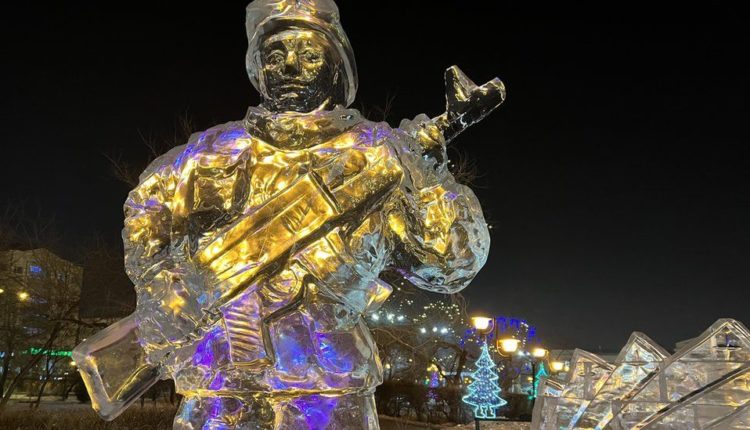A dozen Russian soldiers armed with Kalashnikovs stand motionless on the main square of the Siberian city of Chita.
Add in the wind chill factor and it’s -33C. I’m bundled up in multiple layers of clothes, but I can feel my face freezing.
As people walk past, they stop and stare at the servicemen. Some of them take selfies.
There’s a good reason why the soldiers aren’t moving a muscle. They’re made of ice.
Chita lies 3,000 miles (4,830km) east of Moscow. The local authorities decided that militarised ice sculptures would be an appropriate decoration for this festive season; a way of encouraging a patriotic new year. Most of the people I talk to on the square approve.
“We’re fighting a war,” Tatyana says, “so it’s right to have these ice soldiers here. They’re topical.”
“It’s an unusual way of celebrating the New Year,” Ludmila tells me. “Normally you’d have Santa Claus, bunny rabbits or squirrels. But it’s a sign of the times.”
Ludmila admits she’s worried by what’s happening in Ukraine.
“We’ve got friends who’ve been mobilised and sent to fight there. We worry about them. We call to see if they’re OK. But whatever we may think of our government, our motherland is our motherland. If we don’t defend it, who will?”
“Defend it from what? From whom?” I ask Ludmila. After all, on 24 February it was Russia that launched a full-scale invasion of Ukraine. Not the other way around.
“Defend it from Nazis. There are a lot of them around,” Ludmila replies. “Russia’s being attacked on all fronts, including with LGBT propaganda. They’re trying to force this upon us. We reject these alien ideas. We embrace Russian values. It’s hard for me to explain this in words. I just feel it.”
Russians never used to say these kinds of things to me on the street. They never talked about feeling threatened by “Nazis” in Ukraine, or about the need to fight for so-called “Russian values”. It’s one of the biggest changes I’ve noticed here this year.
Having established total control of the media landscape in Russia, Kremlin propaganda has managed to convince many Russians that their country is now in some existential battle with the West. In conversations here now, I often hear people repeat – almost word for word – the anti-Ukrainian and anti-Western rhetoric they hear on Russian TV channels.
You might think that people in Chita would have more pressing concerns than repelling the onslaught of “Western values”. Despite Siberia enjoying huge gas reserves, the city of Chita has still not been connected to Russia’s domestic gas network. From the hills above the city you can see clouds of smoke rising from coal-fired power stations and from the myriad of wooden houses that are still heated by firewood.
Source: BBC


Comments are closed.